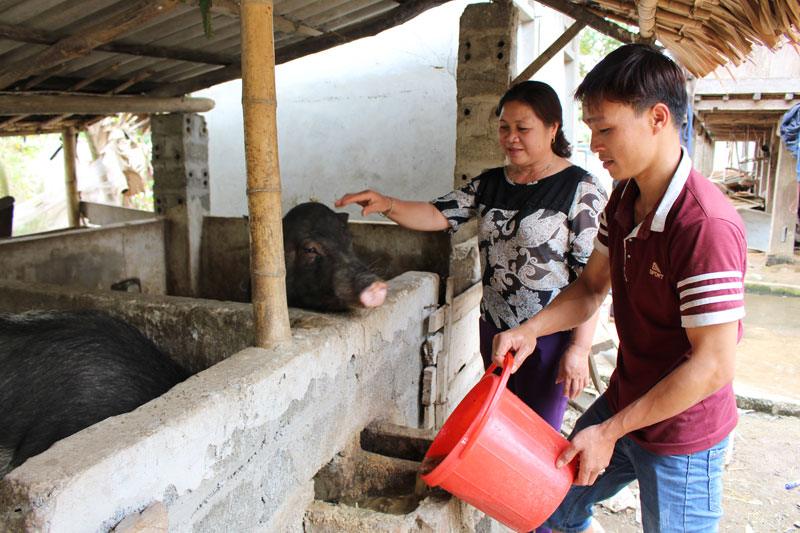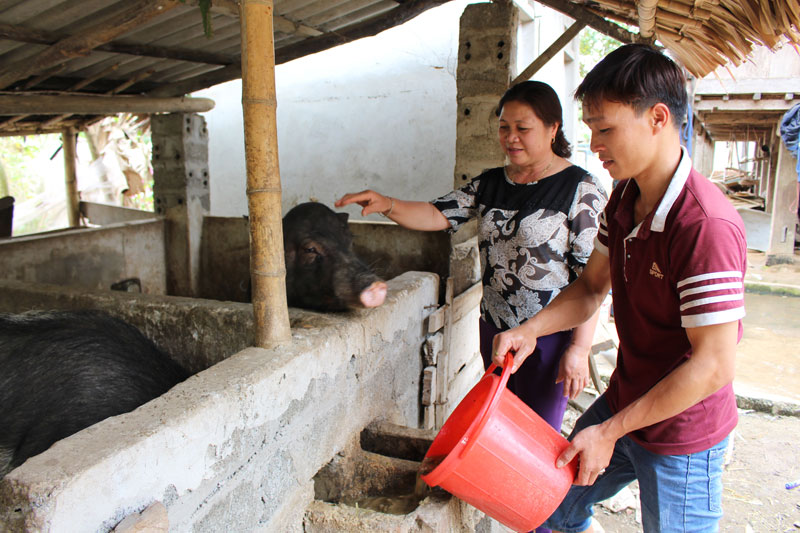
(HBO) – We visited the family of Ha Van Loi in Ve hamlet, Pieng Ve commune of Mai Chau district, when he and his wife were caring for three sows and 14 piglets. The herd of pigs is the result of the couple’s long-term efforts.
They decided to raise pigs
in 2008 after working hard for years, but their incomes could not cover their
living conditions. At that time, their savings were just enough to buy two
piglets. With little capital, temporary pigsty and out-of-date care techniques,
these pigs often suffered diseases and the quality of meat was low.

Ha Van Loi’s family in
Ve hamlet, Pieng Ve commune (Mai Chau) is one of the first households receiving
loans. His family now owns three sows and 14 piglets, with stable income.
Luckily, in 2014, the
communal Farmers’ Association in collaboration with the
Republicof
Korea’s GNI Organisation in
Vietnamimplemented a loan programme through a husbandry cooperative team. Tens of
households applied for loans. After his document was assessed, Loi fortunately
was provided with a loan worth 8 million VND (352 USD).
He shared: "the money,
though not big, was significant to me, as I had more capital to expand pigsty
scale and prevent diseases for the pig herd. Therefore, our husbandry work was
smooth, while the quality of the pig herd was guaranteed. The most wonderful
thing was that I did not have to pay interest and the money paid monthly was
not high. After one year, the loans were provided for other needy households,
through the GNI organisation”.
Together with Loi’s
family, other households in the husbandry cooperative team in Pieng Ve commune
have also used these loans effectively, for upgrading cages, buying more
breeding stocks or cattle-feed grinders.
Nguyen Thi Hue, an
official of the communal People’s Committee who is in charge of managing the
fund, said: "From 13 initial member households, the team now has 26 members,
divided into two groups in Ve and Panh hamlets. All loaned households have
stable production and income, and no overdue payments were reported”.
The members are also
provided with care techniques and measures on how to prevent diseases. They
gather one a month to share difficulties, conveniences and experiences. At present,
from the initial loans, many households expand their farm scales and build
biogas systems. The quantity and quality of animals are improved, helping
increase incomes of the members.
Secretary of the Party
Committee of Pieng Ve commune Dinh Cong Tien affirmed that this model is
effective and needs to be multiplied, given that the commune has 31.16 percent
of poor households.
The establishment of the
cooperative team has contributed to changing traditional small production into
bigger-scale production, which has brought economic efficiency and increased
incomes of locals./.
According to data from the Hoa Binh Provincial Party Committee, the industrial production index for the first six months of 2025 is estimated to have increased by 20% compared to the same period last year. This marks the highest year-on-year growth rate for this period since 2020.
In the first six months of 2025, Hoa Binh province’s export turnover was estimated at 1.145 billion USD, marking an 18.11% increase compared to the same period in 2024. Import turnover was estimated at $ 804 million, a 17.15% increase, which helped the province maintain a positive trade balance.
The lives of the ethnic minority farmers in Tan Lac district have gradually improved thanks to the new directions in agricultural production. This is a testament to the collective strength fostered through the professional associations and groups implemented by various levels of the district’s Farmers’ Union.
With the motto the "product quality comes first,” after nearly one year of establishment and operation, Muong village’s Clean Food Agricultural and Commercial Cooperative, located in Cau Hamlet, Hung Son Commune (Kim Boi district), has launched reputable, high-quality agricultural products to the market that are well-received by consumers. The products such as Muong village’s pork sausage, salt-cured chicken, and salt-cured pork hocks have gradually carved out a place in the market and they are on the path to obtaining the OCOP certification.
In the past, the phrase "bumper harvest, rock-bottom prices" was a familiar refrain for Vietnamese farmers engaged in fragmented, small-scale agriculture. But today, a new spirit is emerging across rural areas of Hoa Binh province - one of collaboration, organisation, and collective economic models that provide a stable foundation for production.
Maintaining growing area codes and packing facility codes in accordance with regulations is a mandatory requirement for agricultural products to be eligible for export. Recently, the Department of Agriculture and Environment of Hoa Binh province has intensified technical supervision of designated farming areas and packing facilities to safeguard the "green passport" that enables its products to access international markets.



